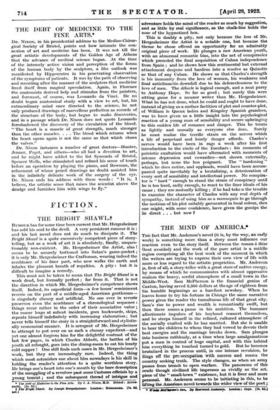FICTION.
THE BRIGHT SHAWL.t
RUMOUR has for some time been current that Mr. Hergesheimer has sold his soul to the devil. A very persistent rumour it is : and his last novel does not do much to dissipate it. The Bright Shawl is a quite excessively competent piece of story- telling, but as a work of art it is absolutely, finally, unques- tionably non-existent. Mr. Hergesheimer the Artist, alas seems to be securely buttoned into Satan's game-pocket ; it is only Mr. Hergesheimer the Craftsman, wearing indeed the semblance of his finer part, who now walks the earth and inhales the pleasant breath of royalties. A pity : but it is difficult to imagine a remedy.
This must not be taken to mean that The Bright Shawl is a work dead, but formally perfect ; far from it. That is not the direction in which Mr. Hergesheimer's competence shows itself. Indeed, its superficial form—a few hours' reminiscent reverie on the part of a middle-aged American gentleman— is singularly clumsy and artificial. No one ever in reverie preserves even the semblance' of a chronological sequence : things recur rather in the order of their associative value ; the muser leaps at salient incidents, goes backwards, skips, repeats himself indefinitely with increasing elaboration ; but never tells himself the story in a straightforward and stylistic- ally economical manner. It is arrogant of Mr. Hergesheimer to attempt to put over on us such a clumsy expedient—and yet one almost forgives him for the delightful contrast of the last few pages, in which Charles Abbott, the battles of his youth all refought, goes into the dining-room to eat his lonely cold supper One still finds such oases in Mr. Hergeshcimer's work, but they are increasingly rare. Indeed, the thing which most astonishes one about him nowadays is his skill in holding the reader's attention to a quite worthless story. He brings one's heart into one's mouth by the bare description of the smuggling of a revolver past some Customs officials by a young tourist ; and the subsequent thread of intrigue and • The Debt of Statieine to the Ant Arts. By J. A. Nixon, M.D. Bristol : Arrow. smith. 128. 6d.J - • The Bright nowt. By Joseph Hergetheinter. London: Heinemann. 17s. 6d. 641 adventure holds the mind of the reader as much by suggestion, and as little by real significance, as the chalk-line holds the nose of the hypnotized hen.
This is doubly a pity, not only because the loss of Mr. Hergesheimer the Artist is a notable one, but because the theme he chose offered an opportunity for an admirably original piece of work. He plunges a raw American youth, with an abnormal romantic bias, into the net of conspiracies which preceded the final acquisition of Cuban independence from Spain ; and he shows how this sentimental but external attachment deepens and hardens into a resolve as Quixotic as that of any Cuban. He shows us that Charles's strength is his immunity from the love of women, his weakness and final anticlimactic downfall due to his defencelessness to the love of men. The &Ude is logical enough, and a neat parry to Anthony Hope. So far so good ; but surely this were sitting game for a meaner writer than Mr. Hergesheimer. What he has not done, what he could and ought to have done, instead of giving us a surface factition of plot and counter-plot, of William le Queux ladies and Kingsley Spanish grandees, was to have given us a little insight into the psychological reaction of a young man of sensibility and secure upbringing to this sudden life of romance and danger. This he treats as lightly and unreally as everyone else does. Surely he must realize the terrific strain on the nerves which a life of perpetual and lonely danger affords. Charles's nerves would have been in rags a week after his first introduction to the circle of the Escobars his moments of patriotic exultation would have alternated with moments of intense depression and cowardice—not shown externally, perhaps, but none the less poignant. The " hardening " which he does notice, and applauds, would have been accom- panied quite inevitably by a brutalizing, a deterioration of every sort of sensibility and intellectual power. No conspira- tor is " hard " enough to stand the strain of conspiracy until he is too hard, sadly enough, to react to the finer ideals of his cause ; they are mutually killing ; if he had take n the trouble to examine the character of Charles with any real depth of sympathy, instead of using him as a mannequin to go through the motions of his plot suitably garmented in local colour, then one might, with some confidence, have given the gossips the lie direct . . . but now ?


















































 Previous page
Previous page